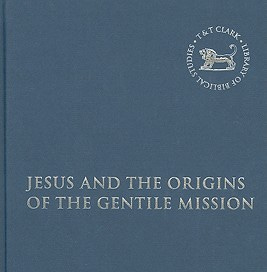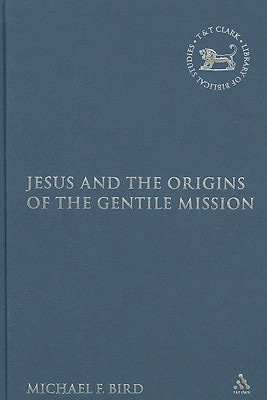The first book I ever wrote was of course my PhD thesis, published as Jesus and the Origins of the Gentile Mission.
I was trying to solve a problem. Jesus was a Jew, Jesus restricted his mission to Israel, Jesus’s disciples were all Jews, the early church was thoroughly Jewish at least until AD 70. And yet, the Jesus movement soon became “Christianity,” a religion of Gentiles that often defined itself over and against the Jews and Judaism. How did this happen?
Or, to put it another way, Jesus said to his disciples, “Go nowhere among the Gentiles, and enter no town of the Samaritans, but go rather to the lost sheep of the house of Israel” (Matt 10.5-6). And yet, at the end of the story, the risen Jesus instructed his disciples to go on a world mission, “Go therefore and make disciples of all nations, baptizing them in the name of the Father and of the Son and of the Holy Spirit, and teaching them to obey everything that I have commanded you. And remember, I am with you always, to the end of the age” (Matt 28.19-20).
How do you get from “A” (Jesus has come to Israel) to “B” (mission to the Gentiles).
Also, what happened at A that made B possible.
The way I got into this topic was by reading N.T. Wright’s Jesus and the Victory of God, a book that really blew my mind and changed my world, and Wright had like a page and a half on Jesus and Gentiles. He explained that Jesus was not the first Jewish prophet to think about the future of Israel vis-a-vis the nations and often a restored Israel would lead to the salvation of the world. So we have to think about passages like Matt 8.11-12/Lk 13.28-29 in light of Jewish restoration eschatology. Wright pointed me to a couple of short books on the topic of Jesus and Gentiles by Joachim Jeremias and T. W. Manson which would become my primary dialogue partners.
So it was, over 2002-5 that I wrote my PhD thesis at the University of Queensland, under Rick Strelan and Bob Webb, on Jesus and the Origins of the Gentile Mission.
In a nutshell, I argued that Jesus was attempting to achieve and enact the restoration of Israel, and in continuity with other strands of Jewish belief, Jesus conceived of the restoration of Israel as resulting in the salvation of the Gentiles. In brief, Jesus, like the prophets before him, believed that a transformed Israel would transform the world (to use the language of G. B. Caird).
The book was examined and passed by Scot McKnight and Peter Bolt. I remained friends with Scot ever since and Scot became something of an academic father figure to me.





So interesting to hear how you started off and who your contacts were. What a path that study set you on. Seeing where you’ve gone since, it gives great hope as to where your readers will go if they keep investigating the truths about God.
Interesting. Why a PhD and which PhD program?